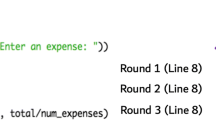Abstract
Code tracing involves stepping through a program in order to predict its output. In the present study (N = 45), we used the think-aloud protocol to gain insight into students’ cognitive processes as they used a computer tutor to study code-tracing examples and work on code-tracing problems, using either a high-scaffolding or a reduced-scaffolding tutor interface. For the cognitive processes, we included both self-explanation and reading behaviors, relying on a qualitative coding to analyze the transcripts. Our results shed light on how different levels of assistance provided by a computer tutor impact student reasoning during code-tracing activities.
Access this chapter
Tax calculation will be finalised at checkout
Purchases are for personal use only
Similar content being viewed by others
Notes
- 1.
A between-subjects design was used because the high potential for order effects rendered a within-subject design not suitable.
References
Bayman, P., Mayer, R.: Using conceptual models to teach basic computer programming. J. Educ. Psychol. 80, 291–298 (1988)
Bisra, K., Liu, Q., Nesbit, J.C., Salimi, F., Winne, P.H.: Inducing self-explanation: a meta-analysis (2018)
Boulay, B.: Some difficulties of learning to program. J. Educ. Comput. Res. 2, 57–73 (1986)
Chi, M.: Quantifying qualitative analyses of verbal data: a practical guide. J. Learn. Sci. 6, 271–315 (1997)
Chi, M.T.H., Bassok, M., Lewis, M., Reimann, P., Glaser, R.: Self-explanations: how students study and use examples in learning to solve problems. Cogn. Sci. 13, 145–182 (1989)
Chi, M.T.H., Leeuw, N., Chiu, M., LaVancher, C.: Eliciting self-explanations improves understanding. Cogn. Sci. 18, 439–477 (1994)
Cowan, J.: The potential of cognitive think-aloud protocols for educational action-research. Act. Learn. High. Educ. 20(3), 219–232 (2019)
Cunningham, K., Blanchard, S., Ericson, B., Guzdial, M.: Using tracing and sketching to solve programming problems: replicating and extending an analysis of what students draw. In: Proceedings of the 2017 ACM Conference on International Computing Education Research (2017)
Ericsson, A.: Valid and non-reactive verbalization of thoughts during performance of tasks towards a solution to the central problems of introspection as a source of scientific data. J. Conscious. Stud. 10(9–10), 1–18 (2003)
Fabic, G.V.F., Mitrovic, A., Neshatian, K.: Adaptive problem selection in a mobile python tutor. In: Adjunct Publication of the 26th Conference on User Modeling, Adaptation and Personalization, pp. 269–274 (2018)
Hertz, M., Jump, M.: Trace-based teaching in early programming courses. In: SIGCSE 2013 (2013)
Hosseini, R., Sirkiä, T., Guerra, J., Brusilovsky, P., Malmi, L.: Animated examples as practice content in a Java programming course. In: Proceedings of the 47th ACM Technical Symposium on Computing Science Education, SIGCSE 2016, pp. 540–545. Association for Computing Machinery, New York (2016)
Jaspers, M.W., Steen, T., Van Den Bos, C., Geenen, M.: The think aloud method: a guide to user interface design. Int. J. Med. Informatics 73(11–12), 781–795 (2004)
Jennings, J., Muldner, K.: When does scaffolding provide too much assistance? a code-tracing tutor investigation. Int. J. Artif. Intell. Educ., 1–36 (2020). https://doi.org/10.1007/s40593-020-00217-z
Lam, M.S.W., Chan, E., Lee, V., Yu, Y.T.: Designing an automatic debugging assistant for improving the learning of computer programming. In: ICHL (2008)
Lopez, M., Whalley, J., Robbins, P., Lister, R.: Relationships between reading, tracing and writing skills in introductory programming. In: ICER 2008 (2008)
Nelson, G.L., Xie, B., Ko, A.J.: Comprehension first: evaluating a novel pedagogy and tutoring system for program tracing in CS1. In: Proceedings of the 2017 ACM Conference on International Computing Education Research, pp. 2–11 (2017)
Pea, R.: Language-independent conceptual “bugs” in novice programming. J. Educ. Comput. Res. 2, 25–36 (1986)
Rittle-Johnson, B., Loehr, A.M., Durkin, K.: Promoting self-explanation to improve mathematics learning: a meta-analysis and instructional design principles. ZDM 49(4), 599–611 (2017). https://doi.org/10.1007/s11858-017-0834-z
Rivers, K., Koedinger, K.: Data-driven hint generation in vast solution spaces: a self- improving python programming tutor. Int. J. Artif. Intell. Educ. 27(1), 37–64 (2017)
Robins, A.V., Rountree, J., Rountree, N.: Learning and teaching programming: a review and discussion. Comput. Sci. Educ. 13(2), 137–172 (2003)
Sorva, J.: Notional machines and introductory programming education. ACM Trans. Comput. Educ. 13, 8:1–8:31 (2013)
Sorva, J., Lönnberg, J., Malmi, L.: Students’ ways of experiencing visual program simulation. Comput. Sci. Educ. 23(3), 207–238 (2013)
Tahir, F., Mitrovic, A., Sotardi: investigating the effects of gamifying SQL-tutor. In: Proceedings of the 28th International Conference on Computers in Education (2020)
Vainio, V., Sajaniemi, J.: Factors in novice programmers’ poor tracing skills. ACM SIGCSE Bull. 39(3), 236–240 (2007)
VanLehn, K., et al.: The Andes physics tutoring system: five years of evaluations. In: AIED (2005)
Weber, G., Brusilovsky, P.: ELM-ART: an adaptive versatile system for web-based instruction. Int. J. Artif. Intell. Educ. (IJAIED) 12, 351–384 (2001)
Weerasinghe, A., Mitrovic, A.: Facilitating deep learning through self-explanation in an open-ended domain. Int. J. Knowl.-Based Intell. Eng. Syst. 10(1), 3–19 (2006)
Weragama, D., Reye, J.: Analysing student programs in the PHP intelligent tutoring system. Int. J. Artif. Intell. Educ. 24, 162–188 (2014)
Wing, J.M.: Computational thinking. Commun. ACM 49, 33–35 (2006)
Wylie, R., Chi, M.T.: 17 the Self-explanation Principle in Multimedia Learning. The Cambridge Handbook of Multimedia Learning, p. 413 (2014)
Xie, B., et al.: A theory of instruction for introductory programming skills. Comput. Sci. Educ. 29(2–3), 205–253 (2019)
Author information
Authors and Affiliations
Corresponding authors
Editor information
Editors and Affiliations
Rights and permissions
Copyright information
© 2021 Springer Nature Switzerland AG
About this paper
Cite this paper
Jennings, J., Muldner, K. (2021). Investigating Students’ Reasoning in a Code-Tracing Tutor. In: Roll, I., McNamara, D., Sosnovsky, S., Luckin, R., Dimitrova, V. (eds) Artificial Intelligence in Education. AIED 2021. Lecture Notes in Computer Science(), vol 12748. Springer, Cham. https://doi.org/10.1007/978-3-030-78292-4_17
Download citation
DOI: https://doi.org/10.1007/978-3-030-78292-4_17
Published:
Publisher Name: Springer, Cham
Print ISBN: 978-3-030-78291-7
Online ISBN: 978-3-030-78292-4
eBook Packages: Computer ScienceComputer Science (R0)




